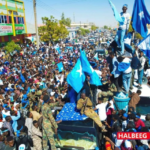Mahad Caanogeel
Somalia, when it became an independent state in 1960, made the nationality law which took almost three years to complete.
On December 22, 1962, Law No. 28 named “Nationality Law”, and it was published on January 22, 1963.
Article 2 of this law indicates how automatic Somali citizenship can be obtained without the need for an application, and it is the process called operation of law. Either of the two methods described below:
1. That the person’s father is Somali;
2. That the person is a Somali who resides in the territory of the Republic of Somalia or resides abroad but is ready to give up another nationality that he already has.
Article 3 of the same law defines firstly who is “Somali”. This law defines “Somali” as any person who is originally, linguistically and culturally a member of the larger Somali ethnic group, even if they do not have citizenship or a passport from another country.
Those who acquire nationality at birth include children born anywhere as long as their father is Somali, meaning a person who by language, origin, or custom is considered to be part of the Somali nation and they have no other nationality.
General Definition of Somali Citizens
The Somali people who fled from neighboring countries and did not have any documents proving that they belong to another nationality, were automatically included as Somali citizens, without any other conditions.
The origin of Somaliness is where the individual comes from is enough, to take the citizenship of the Republic of Somalia.
That law reflected the spirit of Somali liberation and Somali unity that existed at that time. Somalia’s nationality used to be, before the collapse, the type of blood and birth. To this day, Somalis do not disagree with such selection of race based on blood.
Last week, the Federal Parliament of Somalia, tried acting on the 2016 amendment which is yet to be passed. The stumbling block to existing norms, this amendment will overhaul the definitions to include citizenship from either parents meaning addition of maternal claim to citizenship thereby changing the definition of a Somali under the law.
The Somali citizenship law is challenging to rewrite due to the patrilineal nature of Somali society. Patrilineality refers to a cultural system where the family lineage and inheritance pass through the male line. In such a society, a person’s clan, and therefore their rights and privileges, are determined by their father’s clan. This has significant implications for citizenship laws in Somalia because citizenship is tied to clan membership.
In Somalia, citizenship is primarily acquired through descent from a Somali father. This means that if someone’s father is Somali, they are considered Somali regardless of where they were born or whether they have ever lived in Somalia. This system has been in place for a long time and is deeply ingrained in Somali culture and traditions.
Changing the citizenship law would, therefore, require challenging this deeply entrenched cultural belief. It would require a shift away from the patrilineal system and toward a more egalitarian one that recognizes both parents’ contributions to a child’s identity. This would be a significant cultural shift, and it would likely face resistance from those who are deeply committed to the current system.
Moreover, citizenship is a highly politicized issue in Somalia, and any attempt to rewrite the citizenship law would face political challenges. Clan identity is central to Somali politics, and any change to the citizenship law would need to take into account the various clan interests and ensure that no clan feels marginalized or excluded.
In summary, the patrilineal nature of Somali society presents a significant obstacle to rewriting the citizenship law. Any attempt to do so would require challenging deeply ingrained cultural beliefs, addressing political sensitivities, and ensuring that the interests of all clans are taken into account.
CONCLUSION:
This current administration’s attempts at re-writing basic Somali laws may not yield much. It can also be argued that this ruins all the principles of statehood; among them fundamental law: doctrines or assumptions forming normative rules of conduct, separation of state in statecraft.
The parliament, in trying to abrogate this law, is not doing something new! After all this clan selected parliament does not know any sort of principles of popular sovereignty, limited government, separation of powers, federalism, checks and balances, republicanism, and individual rights. Basic knowledge in all world assemblies but foreign concepts to the most incompetent of assemblies worldwide!




